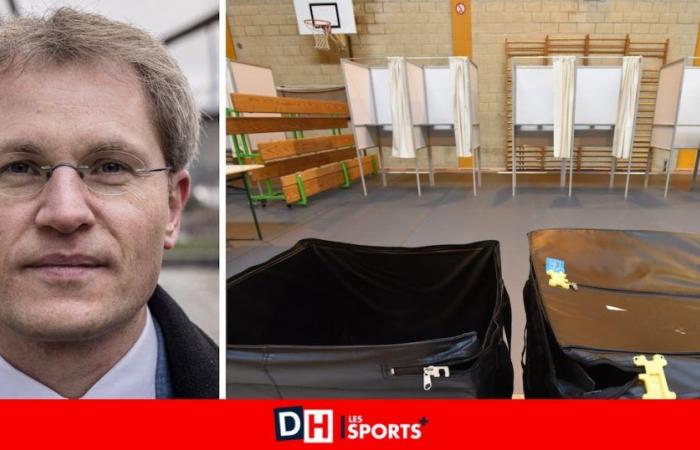
Among the many lessons from these elections, one comes from Flanders, where voting was, for the very first time, no longer compulsory. Many citizens therefore abstained from voting, without fear of sanctions. A decision which had a notable impact on participation, with a 30% drop in the voting rate compared to the 2018 municipal elections. On Sunday, 63% of residents in the north of the country went to the polls, compared to 93% six years ago. earlier.
Communales 2024 – The participation rate in Flanders: between 53.7% in Eeklo and 79.3% in Biévène
This situation obviously raises questions about the legitimacy and representativeness of the results in certain municipalities. Political scientist at the socio-political research and information center, Jean Faniel admits to having been surprised by this drop in participation, while Flanders is traditionally the region in which people vote the most. “It is indeed a strong drop, confirms the political scientist. We did not expect the fall to be so rapid. We rather expected a slow decrease in stages. As it was the municipal elections, that is to say a level to be able to be close to people who can easily identify, we thought that people would get involved, but obviously we were on the wrong track.”
The N-VA rejects the hand extended by Vlaams Belang to Ninove: “I am not going to let myself be bought for the office of alderman”
But once the surprise has passed, Jean Faniel wonders. “In the end, isn’t this drop in participation logical? Isn’t it surprising that we are surprised?”
According to the political scientist, the population’s decline in confidence in politicians may have generated this high abstention rate in Flanders. “We have been talking about a crisis of democracy for a very long time. For a very long time, we have heard people who say that, in any case, no matter how much they vote, nothing will change.”
Abolition of compulsory voting in Flanders: service to democracy or historical error?
For Jean Faniel, the legislator seems to have put blinders on, “giving himself a little illusion with this compulsory vote”. The high participation rate was in fact until then a certain Belgian pride, synonymous with strong citizen involvement, unlike countries like France. But once voting was made optional, turnout plummeted. “In my opinion, compulsory voting remains important. It allows us to reflect the opinions of as many citizens as possible. And we see that when we remove it, the effect is rapid. Perhaps, because we have voted in June, some are already a little tired, with the impression that they vote very often. Although this is not the case: the next time we will vote is in five years (Editor’s note: except in case. hasty elections).”
“It’s totally hypocritical, we must lift the voting requirement,” said former Minister of Justice Vincent Van Quickenborne (Open VLD)
Many factors can explain the low participation in Flanders: disenchantment with politics, a sign of challenge to the established order, laziness to travel… For the political scientist, the Flemish experience shows that “if we want to involve as much as possible of people in collective decision-making, and elections are not an important moment in this collective decision-making, so we must maintain the obligation to vote. It is important so that we have as many people as possible. Now, we must also remember that in June, there were 16.5% of registered people who either did not vote, or voted blank or invalid. compulsory voting, we are already no longer at 100% voting, despite compulsory voting. But once we eliminate compulsory voting, then indeed, it goes backwards, it will decline suddenly.
Transposing the Flemish example to Brussels and Wallonia would therefore not necessarily be a good idea if we want as many voices as possible to be heard. “It could get really concerning.”
“The Vlaams Belang managed to mobilize its electorate where the PTB failed to do so”
Is this the reason for the success of Vlaams Belang in Ninove? Urban beliefs indicate that voting blank, invalid or not voting leads to a strengthening of extremes. “We haven’t seen it here, assures Jean Faniel. Because on the contrary, the PTB seems to have really done the wrong thing in this elimination of compulsory voting. A large part of its electorate seems not to have come to go vote. I rather think that Vlaams Belang managed to mobilize its electorate, at least in Ninove where there was a very strong, very polarized issue.”
Ninove is also in the top 10 of municipalities where participation was the highest. “While the PTB seems to have rather suffered from this removal of the voting obligation. In Antwerp, for example, Jos D’Haese (PVDA) did not manage to mobilize as much as he would have wanted or he could have done so if voting was compulsory. Whereas, on the other hand, Bart De Wever undoubtedly has an electorate who is more mobilized. And so in their duel, there is one who is good. gained in relation to the other, including by this change in the voting obligation.”
What we saw in Flanders with a low participation rate must, however, attract the attention of Brussels and Walloon legislators, who must learn the lessons of what happened in Flanders. “It depends on what they want to do. But in any case, it seems clear that, if we want to maintain a somewhat consistent participation in Wallonia and Brussels, we must not follow the Flemish example.”





